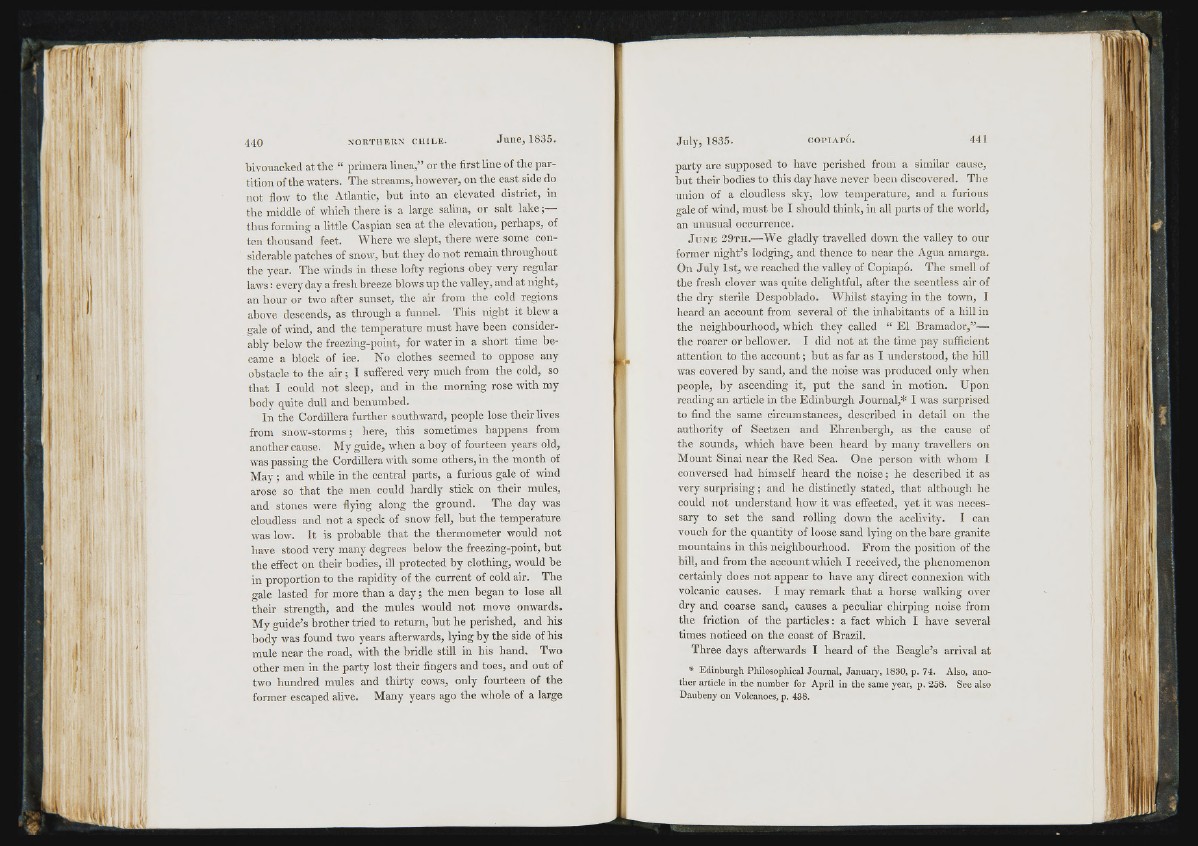
bivouacked at tbe “ primera linea,” or tbe first line of the partition
of the waters. The streams, however, on the east side do
not flow to the Atlantic, but into an elevated district, m
tlie middle of which there is a large salina, or salt lake
thus forming a little Caspian sea at the elevation, perhaps, of
ten thousand feet. Where we slept, there were some considerable
patches of snow, but they do not remain throughout
the year. The winds in these lofty regions obey very regular
laws: every day a fresh breeze blows up the valley, and at night,
an hour or two after sunset, the air from the cold regions
above descends, as through a funnel. This night it blew a
gale of wind, and the temperature must have been considerably
below the freezing-point, for water in a short time became
a block of ice. No clothes seemed to oppose any
obstacle to the air; I suffered very much from the cold, so
that I could not sleep, and in the morning rose with my
body quite dull and benumbed.
In the Cordillera further southward, people lose their lives
from snow-storms; here, this sometimes happens from
another cause. My guide, when a boy of fourteen years old,
was passing the Cordillera with some others, in the month of
M a y ; and while in the central parts, a furious gale of wind
arose so that the men could hardly stick on their mules,
and stones were flying along the ground. The day was
cloudless and not a speck of snow fell, but the temperature
was low. It is probable that the thermometer would not
have stood very many degrees below the freezing-point, but
the effect on their bodies, ill protected by clothing, would be
in proportion to the rapidity of the current of cold air. The
gale lasted for more than a day; the men began to lose all
their strength, and the mules would not move onwards.
My guide’s brother tried to return, but he perished, and his
body was found two years afterwards, lying hy the side of his
mule near the road, with the bridle still in his hand. Two
other men in the party lost their fingers and toes, and out of
two hundred mules and thirty cows, only fourteen of the
former escaped alive. Many years ago the whole of a large
party are supposed to have perished from a similar cause,
but their bodies to this day have never lieen discovered. The
union of a cloudless sky, low temperature, and a furious
gale of wind, must be I should think, in all parts of the world,
an unusual occurrence.
J u n e 2 9 t h .—We gladly travelled down the valley to our
former night’s lodging, and thence to near the Agua amarga.
On July 1st, we reached the valley of Copiapó. The smell of
the fresh clover was quite delightful, after the scentless air of
the dry sterile Despoblado. Whilst staying in the town, I
heard an account from several of the inhabitants of a hill in
the neighbourhood, which they called “ El Bramador,”—
the roarer or bellower. I did not at the time pay sufficient
attention to the account ; but as far as I understood, the hill
was covered hy sand, and the noise was produced only when
people, hy ascending it, put the sand in motion. Upon
reading an article in the Edinburgh Journal,* I was surprised
to find the same circumstances, described in detail on the
authority of Seetzen and Ehrenbergh, as the cause of
the sounds, which have been heard by many travellers on
Mount Sinai near the Red Sea. One person with whom I
conversed had himself heard the noise; he described it as
very surprising ; and he distinctly stated, that although he
could not understand how it was effected, yet it was necessary
to set the sand rolling down the acclivity. I can
vouch for the quantity of loose sand lying on the bare granite
mountains in this neighbourhood. From the position of the
hill, and from the account which I received, the phenomenon
certainly does not appear to have any direct connexion with
volcanic causes. I may remark that a horse walking over
dry and coarse sand, causes a pecuhar chirping noise from
the friction of the particles : a fact which I have several
times noticed on the coast of Brazil.
Three days afterwards I heard of the Beagle’s arrival at
* E d in b u rg h P h ilo so p h ic a l J o u rn a l , J a n u a ry , 1830, p . 74 . A lso , a n o th
e r a rtic le in th e n um b e r fo r A p r il in th e s am e y e a r, p . 2 5 8 . S e e also
D .aubeny o n V o lc an o es, p , 438.